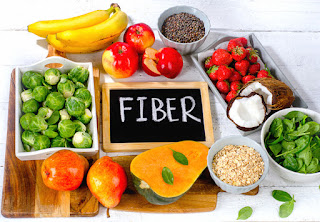What is fiber?
Fiber - a kind of complex carbohydrates, unable to digest by human stomach enzymes, but useful for intestinal microflora and general functions of the digestive system. The main products, rich in fiber, are, first of all, the stems and seeds of plants - in fact, it is the fiber (or "Dietary fiber") that forms their dense structure.
Despite the fact that cellulose is practically not absorbed by the body, it plays a critical role in digestion, providing a mechanical movement of food through the gastrointestinal tract. In addition, it helps to regulate and level the blood sugar level, thus affecting the feeling of hunger and satiety, helping, ultimately, losing weight.
The fiber content in foods
It must be remembered that one cannot blindly trust the tables of fiber content found on the Internet in products - many of them have gross errors. For example, often these tables put grapefruit first in terms of the maximum content of dietary fiber, strangely implying that it is eaten with the peel.
The role played by the fact that the content of fiber in plants varies significantly depending on the variety and method of cultivation, and in the finished food products (for example, whole grain bread or pasta) - from specific production technologies. That is why it is better to focus on the general logic than on a specific figure.
High Fiber foods
As seen from the table, food products, the richest fiber, are bran (in fact, it is a hard shell of grain), flaxseed and whole grains (for example, pearl barley, buckwheat, and oats) - they contain up to 10-15 g of fiber per 100 grams’ dry product. In addition, fiber is abundant in all kinds of legumes (including lentils and peas).
Note also that fiber, contained in oatmeal - beta-glycan - is especially useful for the body. Scientific research suggests that regular use of beta-glycan in food not only normalizes the feeling of hunger and satiety but also lowers the level of bad cholesterol in the blood. That's why oatmeal is one of the best products for breakfast.
Daily fiber intake in the diet
The daily intake of fiber for children and adults is 20-30g. Athletes who need to consume muscle need up to 40 grams of fiber per day due to higher calorie intake and, correspondingly, increased volume of food consumed. Unfortunately, the diet of a typical urban dweller contains at least half the fiber.
The reasons for this are banal - love of potatoes, bread, sweet pastries, desserts, semi-finished products and fast food products, poor not only food fibers, but also vitamins and minerals. However, let us remind once again that it is necessary not to take the pharmacy supplements in tablets, but to consume fresh vegetables and various groats, to replenish the daily norm of fiber.
What is the danger of lack of fiber?
Chronic lack of fiber in the diet provokes numerous metabolic disorders - starting with increasing glucose levels and associated with a constant feeling of hunger, overeating and weight gain, ending with constipation. However, it is necessary to understand that the lack of fiber is primarily a consequence of a complex eating disorder.
Because fiber is found in normal vegetables and cereals, there is no need to look for high fiber recipes, buy pharmacy supplements or expensive "fiber-fortified" foods. It is enough to include natural vegetables in your daily diet while minimizing simple carbohydrates (sugar, white flour products).
Fiber for the treatment of constipation
If you practically do not eat vegetables and cereals and see fruits only in the form of sugar-filled desserts - be sure that you are waiting for problems with digestion (especially constipation), obesity, diabetes and diseases of the cardiovascular system. At the same time, a healthy diet always begins with natural food, and not with the intake of vitamins in tablets.
Pharmaceutical dietary supplements with fiber, as well as various sports supplements containing dietary fiber, are significantly inferior to conventional plant products at a cost. In fact, a jar weighing 150-200 g contains a fiber norm for only a few days - but a pack of ordinary buckwheat will be much cheaper and more effective for normalizing health and digestion.
Fiber for weight loss
They are the fast carbohydrates (for example, sugar) cause a sharp increase in blood glucose levels - this causes the body to produce large doses of insulin to utilize excess energy in fat. At the same time, the presence of fiber in the stomach slows the absorption of glucose into the blood, which has a positive effect on the normalization of insulin levels.
In simple terms, the more fiber you eat, the fewer calories are stored as fat. In addition, dietary fibers physically fill the intestine, causing it to block the feeling of hunger and send a signal to the brain about saturation, which prevents overeating. However, this does not mean that taking fiber in tablets will help you lose weight.




0 Comments
Post a Comment